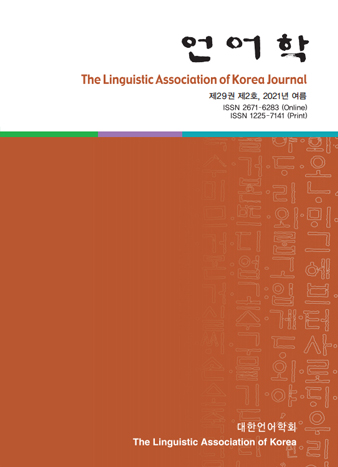대한언어학회 전자저널

29권 2호 (2021년 6월)
- A Corpus-Based Study on the Use of the Conjunctive Adverbial in EFL Learners’ Academic Writing
-
Sungran Koh
Pages : 163-184
Abstract
Koh, Sungran (2021). A corpus-based study on the use of the conjunctive adverbial in EFL learners academic writing. The Linguistic Association of Korea Journal, 29(2), 163-184. The purpose of this study is to identify whether there are differences in the use of conjunctive adverbials (CAs) depending on language proficiency and interlanguage background among Korean EFL learners, native English experts (NEEs) and non-native English experts (NNEEs) and then to enhance the use of CAs in English writing. To do this, the EFL learners corpora were collected twice, before class (BC) and after class (AC). They also wrote one page essays, which were subsequently collected and analyzed. For the experts corpora, NNEE corpus and NEE corpus were retrieved and used in this study. The results first show that EFL learners proficiency developed and they were able to use CAs in a more balanced and impartial way than before class. The next finding is that there was not much difference in NNEE and NEE use of CAs even though they have different interlanguage. NEEs prefer a sentence initial position more than NNEEs. NNEEs used only two CAs (also and therefore) in both initial and medial positions while NEEs used the highest frequent four CAs (for example, however, therefore, thus) in both positions.
Keywords
# conjunctive adverbial # EFL learners # English writing # interlanguage
References
- Altenberg, B., & Tapper, M. (1998). The use of adverbial connectors in advanced Swedish learners’ written English. In S. Granger (Ed.), Learner English on computer (pp. 80-93). Harlow: Addison Wesley Longman Limited.
- Biber, D., Conard, S, & Leech, G. (2003). Student grammar of spoken and written English. London: Longman.
- Biber, D., Johansson, S., Leech, G., Conrad, S., & Finegan, E. (1999). Longman grammar of spoken and written English. Harlow: Pearson Education Limited.
- Bolton, K., Nelson, G., & Hung, J. (2002). A corpus-based study of connectors in student writing. Research from the International Corpus of English in Hong Kong. International Journal of Corpus Linguistics, 7 (2), 165–182.
- Can, C. (2011). Conjunctive adverbs in learner English: A usage-based approach. Age, 21, 92-105.
- Carter, R., & McCarthy, M. (2006). Cambridge grammar of English. Cambridge: Cambridge University Press.
- Celce-Murcia, M., & Larsen-Freeman, L. (1999). The grammar book (2nd ed.). Boston: Heinle & Heinle.
- Chen, C. (2006). The use of conjunctive adverbials in academic papers of advanced Taiwanese EFL learners. International Journal of Corpus Linguistics, 11(1), 113-130.
- Gardezi, S. A., & Nesi, H. (2009). Variation in the writing of economics students in Britain and Parkistan: The case of conjunctive ties. In M. Charles, D. Pecorari, & S. Hunston (Eds.), Academic writing: At the interface of corpus and discourse(pp. 236-250). London: Continuum.
- Granger, S., & Tyson, S. (1996). Connector usage in the English essay writing of native and nonnative EFL speakers of English. World Englishes, 15, 17–27.
- Ha, M. (2016). Linking adverbials in first-year Korean university EFL learners’ writing: A corpus-informed analysis. Computer Assisted Language Learning, 29(6). 1090-1101.
- Halliday, M. A. K., & Hasan, R. (1976). Cohesion in English. New York: Longman.
- Heino, P. (2010). Adverbial connectors in advanced EFL learners’ and native speakers’ student writing. Student Thesis, University of Stockholm, Stockholm.
- Kim, J.-W., & Rhee, S.-C. (2014). A corpus-based study on Korean EFL learners’ use of resultive conjunctive adverbial. The Linguistic Association of Korea Journal, 22(4), 143-161.
- Koh, S.-R. (2014). A Study on the relationship between multiple intelligence and listening proficiency for EFL learners. The Linguistic Association of Korea Journal, 22(4), 163-182.
- Leedham, M., & Cai, G. (2013). Besides, on the other hand: Using a corpus approach to explore the influence of teaching materials on Chinese students’ use of linking adverbials. Journal of Second Language Writing, 22, 374-389.
- Lei, L. (2012). Linking adverbials in academic writing on applied linguistics by Chinese doctoral students. Journal of English for Academic Purposes, 11, 267-275.
- Mauranen, A. (1993). Cultural differences in academic rhetoric: A textlinguistic study.Frankfurt: Peter Lang.
- Milton, J., & Tsang, E. (1993). A corpus-based study of logical connectors in EFL students’ writing: Directions for future research. In R. Pemberton & E. Tsang (Eds.), Lexis in studies (pp. 215-246). Hong Kong: Hong Kong University Press.
- Narita, M., Sato, C., & Sugiura, M. (2004). Connector usage in the English essay writing of Japanese EFL learners. In Proceedings of 4th International Conference on Language Resources and Evaluation. LREC, 1171–1174.
- Park, Y. (2013). How Korean EFL students use conjunctive adverbials in argumentative writing. English Teaching, 68(4), 263-284.
- Quirk, R., Greenbaum, G., Leech, G., & Svartvik J. (1985). A comprehensive grammar of the English language. London: Longman.
- Serpil, U., & Ceyhun, Y. (2017). A corpus-based study on the use of the logical connector ‘Thus’ in the academic writing of Turkish EFL learners. English Language Teaching, 10(2), 64-72.
- Shaw, P. (2009). Linking adverbials in student and professional writing in literary studies: What makes writing mature. In M. Charles, D. Pecorari, & S. Hunston (Eds.), Academic writing: At the interface of corpus and discourse (pp. 215-235). London: Continuum.
- Swales, J. M., & Feak, C. B. (Eds.). (2004). Academic writing for graduate students (2nd ed.). Ann Arbor, MI: The University of Michigan Press.
- Tapper, M. (2005). Connectives in advanced EFL learners’ written English - preliminary results. In F. Heinat & E. Klingvall (Eds.), Working papers in linguistics 5 (pp. 115-144). Lund: Department of English, Lund University.
- Tarone, E. (2006). Interlanguage. In K. Brown (Ed.), The encyclopedia of language and linguistics (pp. 747–752). Boston, MA: Elsevier.
- Yeung, L. (2009). Use and misuse of ‘besides’: A corpus study comparing native speakers’ and learners’ English. System, 37, 330-342.
- Yoon, J., & Yoo, I. (2011). An error analysis of English conjunctive adjuncts in Korean college students’ writing. English Teaching, 66(1), 225-244.